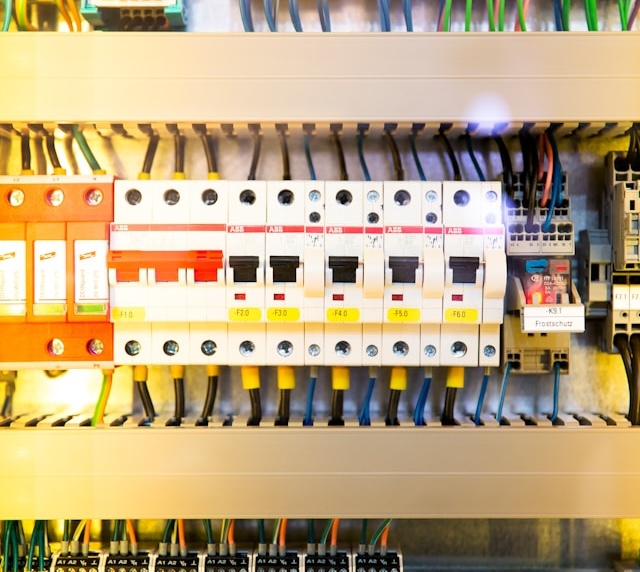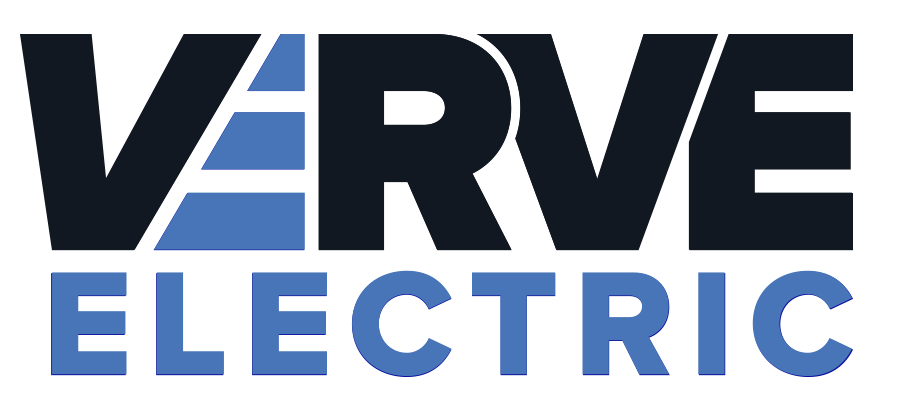The Real Risks of Outdated Electrical Panels and How Verve Electric Solves Them
October 6, 2025When you run a business, your electrical system is more than just utility, it’s the backbone of everything you do: lighting, equipment, computers, machinery, hot tubs, or specialty gear. An outdated electrical panel may seem like something you “can live with,” but in truth, it poses risks that can cost you safety, downtime, and money. Verve Electric knows how costly those risks are—and more importantly, how to eliminate them.

Why Outdated Electrical Panels Are a Problem
An electrical panel (breaker box, fuse box, service panel) is the hub where power from the utility enters your building and gets distributed to circuits. Over time, demands on that system increase, materials age, and codes evolve. If your panel is old or failing, several issues may arise:
- Overload & Fire Risk Older panels may not have enough capacity (amperage or number of circuits) to safely handle modern loads. When too much current flows through, wires or breakers overheat, insulation degrades, and fire risk increases. Components crack, connections loosen, causing arcing, burning smells, and possibly ignition of nearby materials.
- Frequent Breaker Trips, Outages, Flickering Lights If your business has added equipment—like heavy machinery, multiple computers, high‑powered lighting, a hot tub, EV chargers—the original panel might be pushed beyond what it was designed for. Result: breakers constantly trip, lights dim or flicker when load changes, devices may fail or behave poorly. These disrupt operations and productivity.
- Non‑Compliance With Current Codes & Insurance Issues Codes and standards change. What was fine 30 or 40 years ago may violate today’s Ontario Electrical Safety Code (OESC) and Canadian standards. An old panel might also lack modern safety features like ground fault interrupters (GFCIs), arc fault protection, correct labeling, adequate grounding, or a proper main disconnect. Insurance companies may refuse coverage or raise premiums for properties that use panels that are known to have safety issues or that lack required approvals.
- Safety Risks to People & Property Beyond fire, there’s risk of electric shock, injuries, or damage to expensive business equipment. Moisture, rust, loose wiring, corroded contacts all degrade safety. Signs like buzzing sounds, burning odors, scorch marks matter. Once these appear, the danger is real.
- Reduced Capacity for Growth / High Demand If you plan to expand: add more lighting, more computers, a hot tub or specialized machinery, you may find your panel cannot support that without unsafe loads, constant trips, or expensive temporary fixes. An outdated panel limits future growth.
- Hidden Costs Slower, inefficient delivery of power; inefficiencies due to heat loss; higher maintenance costs; emergency repairs. Often businesses defer upgrades until a failure causes downtime, which ends up costing much more.
Comparing Old vs Modern Electrical Panels
Here’s a table summarizing major differences, to help you see at a glance what you might be getting with an older panel compared to a modern, properly‑installed one.
| Feature | Older / Outdated Panel | Modern / Upgraded Panel |
|---|---|---|
| Capacity & Amperage | Lower capacity, often 60‑100 amps in small buildings; limited number of circuits. May rely on fuse boxes. | Higher capacity (e.g. 200 amps or more), sufficient circuits for modern load; room to expand. |
| Safety Features | Minimal or no arc fault protection; limited GFCI protection; deficient grounding; older wiring types; possibly loose or corroded connections. | Meets current code: arc fault breakers, GFCIs, proper grounding and bonding; corrosion‑resistant materials; good connection integrity. |
| Reliability | Frequent breaker trips; flickering lights; risk of failure under load; heat buildup; higher downtime. | Stable performance under varied load; smoother handling of surges; fewer interruptions; consistent power for all systems. |
| Code Compliance & Insurance | Likely non‑compliant with current OESC; may be using panels from brands with known recalls or problems; insurance risk. | Fully compliant; certified components; proper permits; improves insurance profile; helps with resale or inspections. |
| Maintenance & Lifespan | Aging components, rust, wear; higher costs in upkeep; risk increases with age. | Designed for longer lifespan; durable components; lower maintenance; better warranty options. |
| Suitability for Demand Growth | Limited ability to support hotspots: higher‑power equipment, EV chargers, expanded lighting or heavy machinery. | Designed with expansion in mind; supports new appliances, hot tubs, automation, office equipment etc. |
Local Considerations for Kitchener Businesses
For businesses in Kitchener or the surrounding Waterloo region, there are some additional local elements to keep in mind:
- The Ontario Electrical Safety Code (OESC) enforces standards that must be met, including permits and inspections. Upgrades generally must be done by licensed electricians.
- Weather & climate (cold winters, moisture, fluctuations) can exacerbate rust or wear, making older panels more susceptible to problems.
- Older buildings may have legacy wiring (aluminum wiring, fuse boxes, obsolete panel brands) needing more extensive remediation.
- Local utilities and city inspectors will likely flag outdated or unsafe panels during renovations, sales, or lease agreements.
How Verve Electric Solves These Problems
Verve Electric offers tailored solutions for businesses in Kitchener and nearby areas. Here’s how Verve addresses every one of the above risks and helps ensure your electrical system is safe, reliable, and ready for future growth.
- Comprehensive Panel Assessment Before any work begins, Verve Electric performs a full diagnostics: Look at the panel’s age, condition, its capacity vs current usage, brands/components, wiring condition, vents, whether it meets current safety code features (grounding, arc‑fault, GFCI). Finding evidence of rust, overheating, bulging wires, scorched terminals signals the need for upgrade.
- Code‑Compliant Upgrades Verve only installs panels that meet the latest Ontario Electrical Safety Code. That includes selecting the right amperage, breakers, safety features, and securing all required permits. They also ensure the system is properly grounded, have a reliable main disconnect, and label circuits clearly.
- Choosing the Right Size & Capacity Rather than over‑ or under‑specced panels, Verve sizes the panel based on your current and projected load. If your business will add equipment—hot tubs, specialized machines, EV chargers—planning for that in advance means fewer headaches later.
- Modern Safety Features Verve installs arc‑fault circuit interrupters where needed; GFCI protection in wet areas; uses corrosion‑resistant materials; ensures tight and clean wiring; checks neutral and ground bars; ensures safety in enclosure seals.
- High‑Quality Installation & Parts Using licensed electricians, good materials, reliable breaker brands, clean wiring habits. Ensuring connections are tight, parts aren’t overloaded, enclosures are secure and dry. Minimizing exposure to moisture or corrosive environments.
- Permits, Inspections, and Follow‑Up Verve handles the permitting process, coordinates any required ESA inspection or local inspection, ensures paperwork is in order. After installation, they perform safety checks, tests, sometimes offer maintenance follow‑ups to ensure long‑term health of the system.
- Minimizing Downtime & Business Disruption Because they understand businesses may need to remain operational, Verve plans work to minimize downtime: scheduling, working off hours, coordinating phases where parts of electrical load may need to remain active while others are switched over.
- Future‑Proofing with Scalability Verve designs the upgraded panels with future needs in mind: extra space for additional breakers, capacity for new appliances or business expansion. They also make sure you’ve got updated wiring where needed, so you don’t have to rip things out later.
What to Watch For: Signs Your Panel Needs Upgrading
Here are some warning signs to look for in your business or commercial facility that may signal it’s time for a panel upgrade:
- Breakers that trip often, especially under regular loads (lighting + equipment)
- Lights that flicker, dim, or surge when machines or high‑draw equipment turn on
- Burning smells, buzzing or crackling noises near the panel
- Visible rust, corrosion, scorch marks, moisture inside or near the panel enclosure
- Lack of sufficient circuits (everything plugged in, no circuits to spare)
- Old fuse boxes instead of breaker‑based panels
- No main shut‑off or safety disconnect, or unreliable wiring
- Older panels with brands known to have safety issues
Case Example: How Verve Helped a Local Business
(Hypothetical based on typical cases)
A small wellness centre in Kitchener with hot tubs and massage rooms had frequent tripping breakers. Their panel, installed in the 1970s, was rated 100 amps and used outdated fuses in some subcircuits. Because of renovations and adding new equipment, the system was strained. Verve Electric performed an assessment, upgraded to a 200‑amp breaker‑based panel, replaced subcircuits that were old or unsafe, installed GFCI protection near wet areas, and re‑wired loose connections. The client saw immediate improvements: no more tripping, better performance of lighting, safer operation of hot tubs, and lower anxiety about possible hazards. Insurance inspections passed cleanly.
Costs vs Benefits: Why Upgrading Makes Sense
Upfront cost is always a concern. But when you balance that against the risks, the advantages become clear:
- Reduced risk of fire, damage, liability
- Lower maintenance / emergency repair costs
- Improved efficiency and possibly lower energy bills because components run cooler and more reliably
- Greater reliability for your operations, less unexpected downtime
- Improved safety for workers, clients, tenants
- Better compliance with insurance and building codes, smoother inspections, higher property value
- Ability to handle future expansions or new electrical demands without massive retrofits
What the Upgrade Process Looks Like with Verve Electric
Here’s a general outline of how Verve approaches a panel upgrade project:
- Initial Consultation & Survey Verve Electric meets with you, inspects existing panel and wiring, assesses load, usage, future needs, budget.
- Design & Proposal They determine what size panel is needed, what safety features are required, what materials will be used, estimate costs, timelines, permit needs.
- Permits & Code Pre‑Work Apply for necessary permits, obtain any approvals, ensure utility connections are compatible, ensure compliance with OESC, ESA (Electrical Safety Authority) in Ontario.
- Installation Schedule the upgrade, possibly during off hours. Remove or isolate old panel, install new one, re‑wire circuits as needed, add required protection (GFCI, arc‑fault), ensure grounding, label everything neatly.
- Testing / Inspection Perform safety tests, load tests, inspections per code. Make sure everything works under expected loads. Obtain final sign‑offs (ESA or local building department).
- Handover & Maintenance Advice After everything is done, Verve Electric walks you through the new panel: how to reset breakers, what load limits are, what to watch for. Offer maintenance suggestions: periodic inspections, keeping panel area clean/dry, checking for corrosion, etc.
Conclusion: Don’t Wait Until It’s Too Late
Outdated electrical panels are not just an inconvenience. They’re a serious liability. For businesses, the risks multiply: damage to property and equipment, safety of staff and clients, disruption to operations, and potential legal or insurance issues.
Verve Electric, located at 68 Iron Gate Street, Kitchener, ON N2N 3R6, specializes in solving exactly these problems. Upgrading panels, installing modern safety features, ensuring code compliance, minimizing business disruption—all while preparing your electrical system for growth.
If you see any warning signs or know your panel is old, contacting a professional like Verve Electric isn’t just wise—it’s essential. It could be the difference between smooth operations and a serious, preventable disaster.
